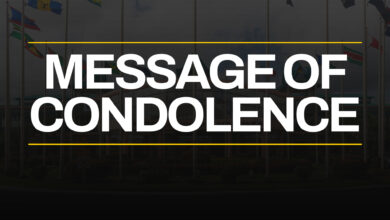THEME: LEADERSHIP THROUGH PARTNERSHIP
It is my pleasure to bring greetings to the Chairman and delegates at the Opening Ceremony of the Fourth Annual General Meeting of the Pan Caribbean Partnership Against HIV/AIDS (PANCAP). I regret that I cannot be physically present, but this is largely due to the fact that St. Kitts and Nevis is in the terminal stages of its general elections scheduled for 25th October (just four days away).
As Prime Minister with responsibility for Human Resources, Health and HIV/AIDS in the quasi cabinet of the Caribbean Community (CARICOM), I have witnessed the growth as well as the challenges in the development of PANCAP. And I am impressed with the strides by this Partnership in its four years of existence.
PANCAP as a concept was promoted by Prime Minister Owen Arthur at the first ever Regional Meeting on HIV/AIDS convened by the Government of Barbados, in collaboration with the World Bank, in September 2000 in Barbados.
The Vision of PANCAP
In February 2001, with Prime Minister Owen Arthur then Chairman of the Community, I signed the Pan Caribbean Partnership Initiative on behalf of CARICOM along with 6 other signatories. Among them were Sir George Alleyne representing the Pan American Health Organisation (PAHO), Dr. Peter Piot representing UNAIDS and Ms. Yolanda Simon representing CRN+. This act was a symbolic, yet tangible recognition of the enormity of the challenges faced by the Region in combatting this disease. It was a recognition too of the need for a collective rather than an individual approach. It was clear then, as it is now, that HIV/AIDS, rampant especially among the most productive members of our societies – our young men and young women – needed a regional and collective strategy.
Positive Developments
I recall with pride the United Nations General Assembly Special Session on HIV/AIDS in New York in June 2001, when PANCAP mobilised a delegation comprising Heads of Government, Ministers of Health and other technical officers from the Region. The impact of this Caribbean “collective” on new directions in the world's approach to the fight against HIV/AIDS, including the initiation of the Global Fund to Fight Aids, Tuberculosis and Malaria (GFATM), cannot be easily erased
I also recall Barcelona in July 2002, at the XIV International HIV/AIDS Conference when the PANCAP group including Ministers of Health and other officials witnessed the signing of an agreement between PANCAP and six (6), pharmaceutical companies for significant reductions in the price of ARVs and more significantly, a common regional price. It was the first such regional initiative which has since been used as a model.
Further, I recall, the World Bank's 4th Annual Conference on Leadership in an Interdependent World, in June 2003 and the PANCAP Group's advocacy for increasing support for the fight against HIV/AIDS, which resulted in the World Bank Grant offer of US$9M. The signing of the World Bank Grant Agreement took place at the Tenth Meeting of the Council for Human and Social Development (COHSOD) in Tobago in April of this year, and I understand that the announcement of the first disbursement will be made at this meeting.
I recall Bangkok in July 2004, and the prominent role of the PANCAP delegation. The outstanding PANCAP booth with exhibits from all over the Caribbean including Cuba, Haiti and the British Virgin Islands, and the interest it generated from representatives from the world over.
These collective ventures fully demonstrate the value of perfecting PANCAP as the regional response to the fight against HIV/AIDS.
The Caribbean Regional Strategic Framework: A Road Map for Collective Action
PANCAP since its inception has to be credited for its leadership in visioning a road map for the accelerated response to HIV/AIDS.
Our good fortune is that PANCAP was launched on the solid basis of considerable research. First, the Plan of Action developed in the late 1990's by a core group chaired by Dr. Barry Wint, then CARICOM Programme Manger of Health Sector Development. Next, there was the reformulation of that plan into a Caribbean Regional Strategic Framework (CRSF), a well defined “tool” that provides an orderly guide to resource mobilisation and to the rationalisation of resources.
In this regard, PANCAP is regarded internationally as a model of regional action against HIV/AIDS. But we must not underestimate and take for granted the extraordinary time and energy invested by partners, particularly the CARICOM Secretariat, in designing the countless proposals, negotiating with donors, consulting with stakeholders, establishing fiduciary mechanisms and taking responsibilities for the tedious day-to-day coordination of a desperate group, each with its own specific requirements.
Partners in Planning a Viable Regional Strategy
I expect that this meeting would take a leap forward in a way that was not possible before. PANCAP is now in a position where, at last, funds for programme implementation are coming on stream. I refer in particular to the approval and disbursement of new resources since the last AGM: funds from the GFATM, the World Bank, the GTZ, the KfW and DFID and the continuation of grants from the EU, CIDA and USAID.
On behalf of the Community I express profound gratitude to our donor partners. They may, however, recognise that notwithstanding their generous support so far there is still a major gap in the resources required for implementing the Caribbean Regional Strategic Framework (CRSF). More resources properly managed to avoid unnecessary duplication and a more consolidated approach are not only appropriate but vitally expedient in the region's fight against HIV/AIDS. I expect this meeting to make some bold decisions in this direction.
In the case of the OECS, which received a GFATM grant in the third round of awards, we express our gratitude to the Clinton Foundation and other PANCAP Partners for technical assistance in the true spirit of a partnership.
I am happy to note that the AGM will focus on the accelerated agenda for care and treatment and the increasing availability of ARVs for PLWHA. It is imperative that delegates leave this meeting with a decided plan of action for increasing access to ARVs. On this issue it is Time for Action, NOW.
I am pleased to note that stigma reduction will be discussed. The Community is making every effort to confront this challenge and, in collaboration with the Government of the United Kingdom and DFID, itself a PANCAP Partner, CARICOM is hosting a high level meeting in St. Kitts and Nevis at the end of November. This meeting will seek to identify champions for change; champions with a commitment to changing the attitudes and values of governments, private sector, NGOs, the churches, youth groups, the labour unions and workers, indeed all sectors of society, in promoting the reduction of stigma and discrimination related to HIV/AIDS. This orientation must be intertwined with policies for care and treatment and prevention, if we in this region are to claim any success in curtailing the spread of HIV/AIDS.
Placing People Living with HIV/AIDS (PLWHA) at the Centre of Leadership in Partnership
But to achieve the PANCAP objectives we have to join hands and hearts with PLWHA to advocate for and implement legislation to stop all forms of stigma and discrimination. The PANCAP programme promises model legislation. This is vital, and so are the ethical issues related to confidentiality and human rights. PLWHA have a right to work, a right to send their children to school, a right to participate in their communities, a right to be part of the decision-making process. PLWHA have the right to live with dignity.
But also vital in our endeavours is for PLWHA to play a more prominent role and to be more visible and more vocal. Hence my challenge to the members of CRN+, a core partner in PANCAP., Come forward as champions. Use the PANCAP umbrella to confront the government. Confront the business community. Confront and the school system. Confront the churches. In fact confront every sector and all strata of society. The Region needs to recognise that we are all enjoined in this battle against HIV/AIDS, for we are either infected, or affected and in many cases we are both.
Let this meeting of PANCAP take us beyond the crossroads. Let it take us down a path to accelerated implementation of strategies. Let us use this 4th AGM to demonstrate that this fight is truly “Leadership through Partnership.”
With every good wish for successful and productive deliberations.





